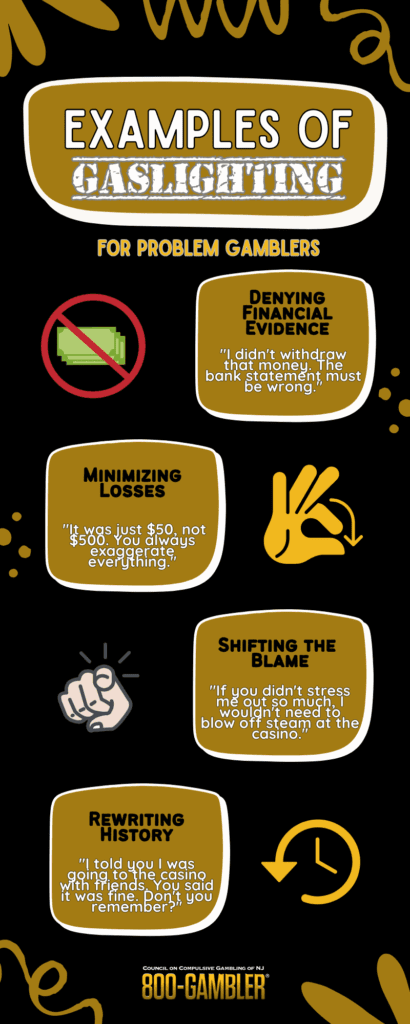Gaslighting has risen in popularity as a term over recent years. Some might argue it’s one of those words used so often that its impact gets somewhat “negated” in everyday conversation. But gaslighting is very real, and it’s something you should be aware of if you’re dealing with problem gambling — whether it’s your own struggles or those of someone you care about.
What Is Gaslighting?
Gaslighting is a form of psychological manipulation where someone makes you question your own reality, memories, or perceptions. The term comes from a play-turned-film from the 1930s, where a husband deliberately dims the gas lights in their home while telling his wife she’s imagining things when she notices.
In real life, gaslighting shows up in statements like:
- “That never happened. You’re making things up.”
- “You’re too sensitive. I was just joking.”
- “You’re crazy — no one else has a problem with this.”
- “I never said that. You must be confused.”
While we often talk about gaslighting in romantic relationships, it affects many situations. People who struggle with substance use, financial problems, or gambling issues might use gaslighting tactics to protect their behavior from scrutiny.

How Problem Gamblers Use Gaslighting
When someone deals with problem gambling, they might use gaslighting to hide their activities or avoid facing consequences. These patterns develop gradually and often unconsciously as the person tries to maintain their gambling habits.
Common examples include:
- Denying financial evidence: “I didn’t withdraw that money. The bank statement must be wrong.”
- Minimizing losses: “It was just $50, not $500. You always exaggerate everything.”
- Shifting blame: “If you didn’t stress me out so much, I wouldn’t need to blow off steam at the casino.”
- Rewriting history: “I told you I was going to the casino with friends. You said it was fine. Don’t you remember?”
- Making you doubt your concerns: “Everyone gambles sometimes. You’re making a big deal out of nothing.”
Problem gamblers might start believing their own distortions as a way to avoid facing the painful reality of their situation.
Signs You’re Being Gaslighted by a Problem Gambler
Recognizing gaslighting can be tricky because it makes you doubt your own perceptions. Watch for these warning signs:
- You constantly apologize for bringing up concerns about gambling behavior.
- You find yourself second-guessing your memory about money discussions or missing funds.
- You feel confused after conversations about gambling or finances.
- You notice missing money but accept explanations that don’t fully add up.
- You feel like you’re walking on eggshells when discussing certain topics.
- You discover gambling receipts or activity that contradicts what you’ve been told.
If several of these patterns sound familiar, you might be experiencing gaslighting from someone with gambling problems.
How to Deal with Gaslighting from Problem Gamblers
Addressing gaslighting requires care and thoughtfulness. It’s a delicate situation where overreacting or proceeding without good information can make things worse.
Here are some helpful approaches:
- Trust your instincts: If something feels wrong about the explanations you’re getting, pay attention to that feeling. Your intuition often picks up on inconsistencies before your conscious mind can articulate them.
- Document everything: Keep records of financial statements, conversations, and incidents. Concrete evidence helps combat the “did that really happen?” doubts that gaslighting creates.
- Set clear boundaries: Let the person know specific behaviors that aren’t acceptable. For example: “I need honesty about where money is going. Hidden gambling expenses break my trust.”
- Avoid heated confrontations: Instead of accusatory language, try “I” statements: “I feel confused when the bank statement shows casino charges, but you told me you were at work.”
- Seek outside perspective: Talk to trusted friends or family members who can help confirm your reality. Ask them: “Does this situation seem concerning to you?”
- Take care of yourself: Gaslighting can be emotionally draining. Make time for activities that help you stay grounded and centered.
Getting Professional Help for Gaslighting and Problem Gambling
Both the person who gambles and their loved ones benefit from professional support when gaslighting is involved.
For problem gamblers:
- Therapy can help you recognize how gaslighting hurts your relationships.
- Support groups offer space to be honest without fear of judgment.
- Financial counseling provides tools to address the practical impacts.
For family and friends:
- Family therapy helps rebuild damaged trust.
- Support groups connect you with others who share similar experiences.
- Individual counseling supports your emotional health through this challenge.
Moving Forward: Breaking the Gaslighting Cycle
Breaking free from gaslighting patterns takes time and commitment from everyone involved. The person with gambling problems must be willing to acknowledge the manipulation, even when it wasn’t intentional. They’ll need to practice radical honesty, even about small things that might seem insignificant. Accepting accountability without defensiveness becomes crucial to healing relationships damaged by gaslighting. Most importantly, they must rebuild trust through consistent actions, not just promises, as words alone won’t repair the harm caused.
As someone supporting a problem gambler, you can maintain healthy skepticism without becoming cynical about their efforts to change. It’s vital to validate your own experiences and perceptions rather than allowing them to be dismissed. While supporting recovery, celebrate progress but remain vigilant about potential backsliding into old patterns. Recovery rarely follows a straight line. Setbacks happen and are part of the process, not proof that change is impossible.
Gaslighting Demands Immediate, Caring Support
Gaslighting is not something to take lightly. It’s a situation that requires timely, accurate, and caring support. The psychological toll it takes on both the person who gambles and their loved ones can be significant and long-lasting.
With our 24/7 confidential helpline, you can call 1-800-GAMBLER and receive all kinds of resources to help make dealing with gaslighting easier, whether you’re struggling with problem gambling yourself or a friend/family member supporting someone who constantly gaslights. Help is available; all you need to do is give 800-GAMBLER a call today.
Recognizing gaslighting is the first step toward healthier relationships and recovery from problem gambling. You deserve honesty — both from others and yourself.



